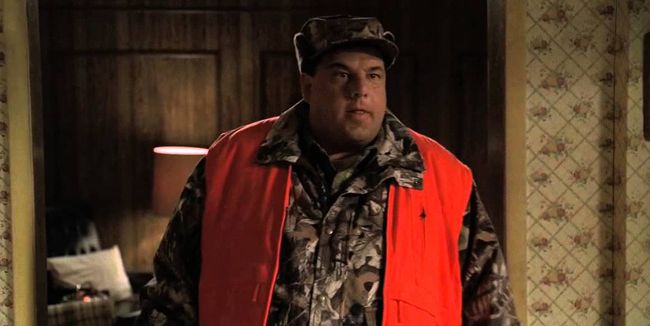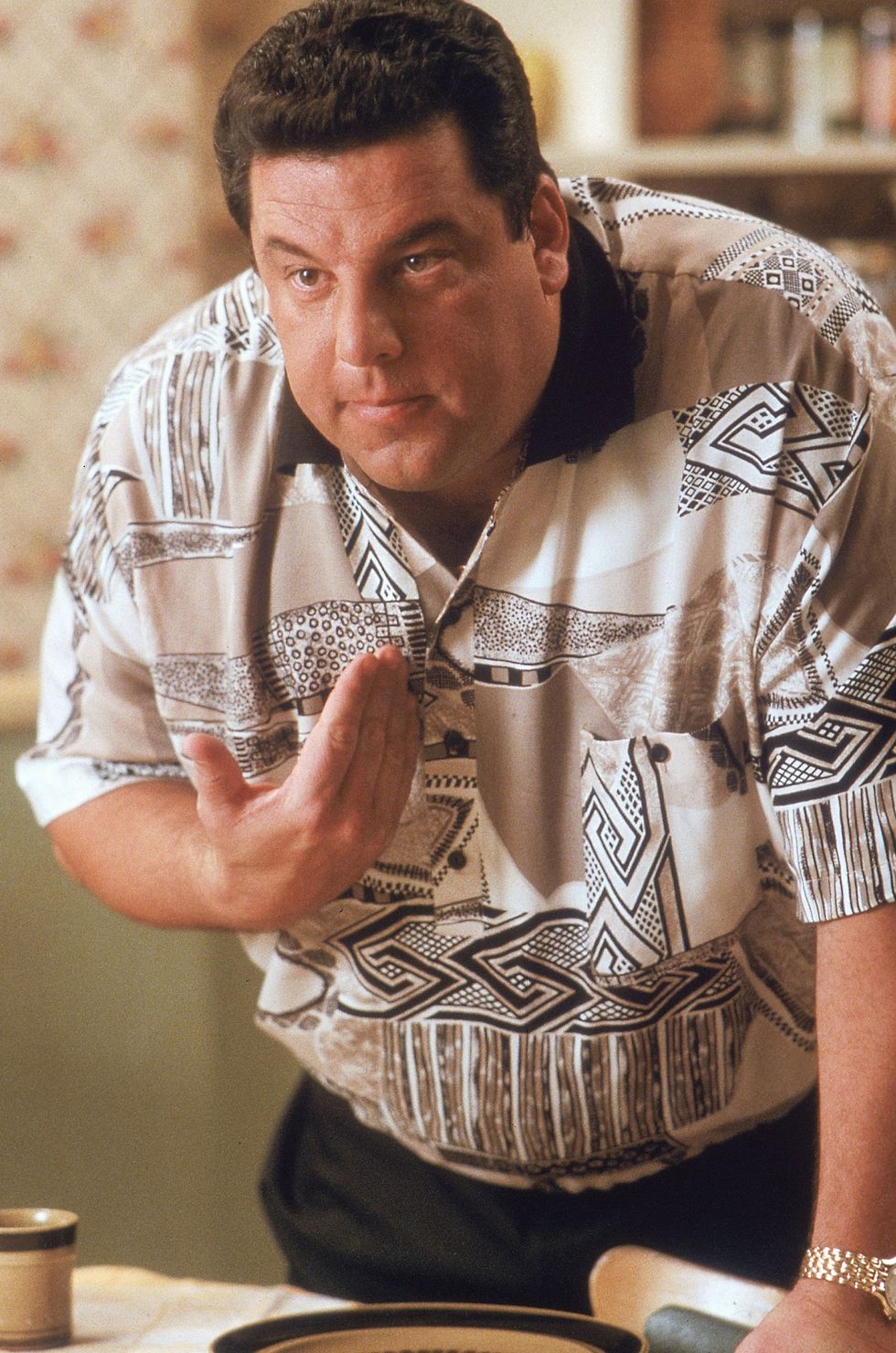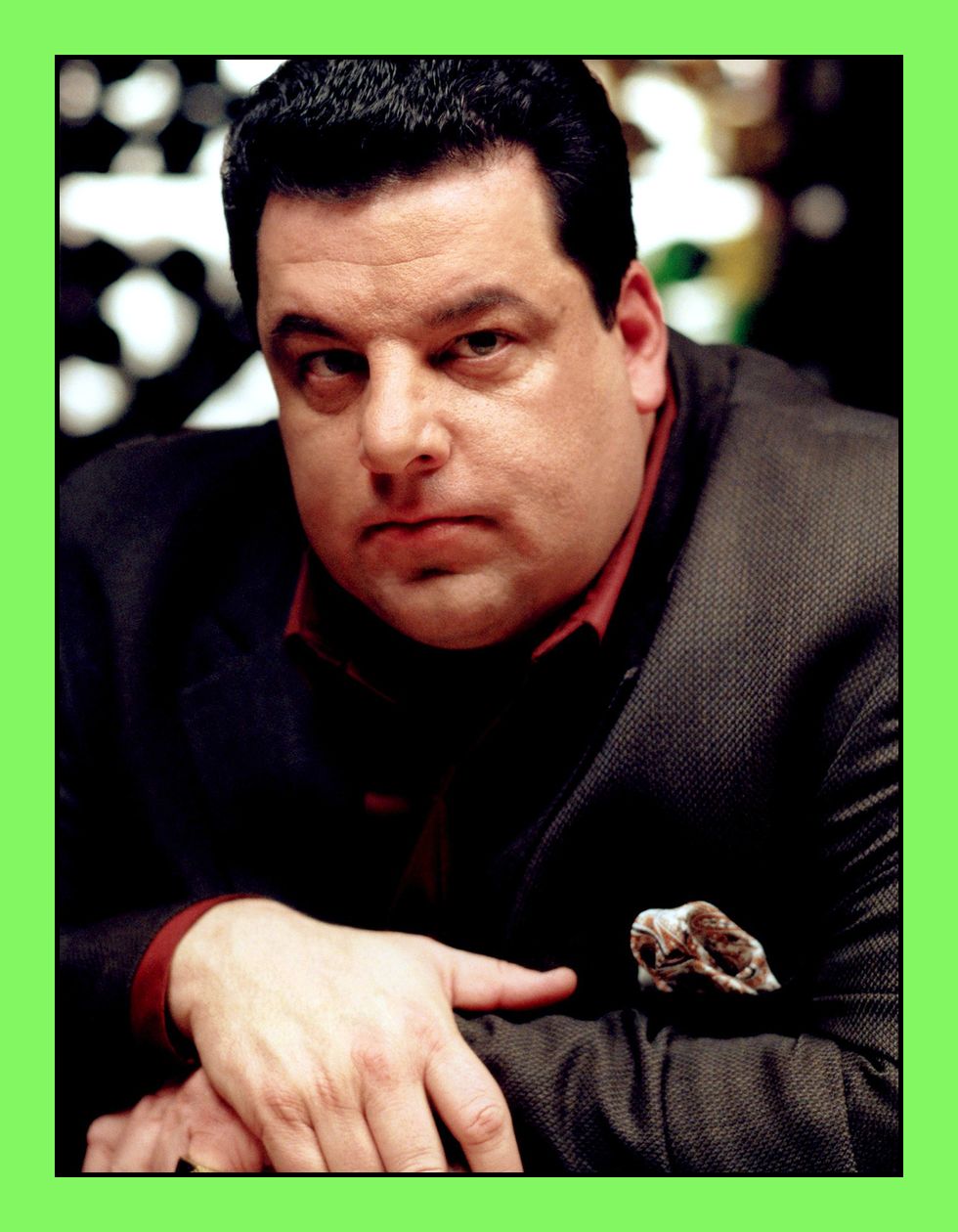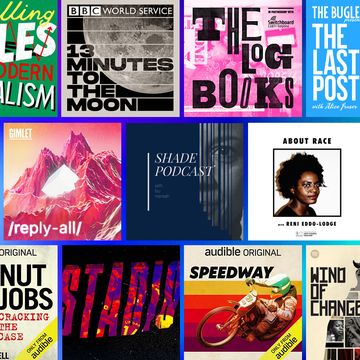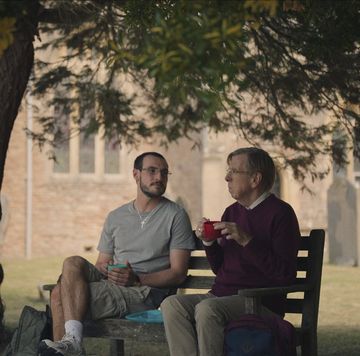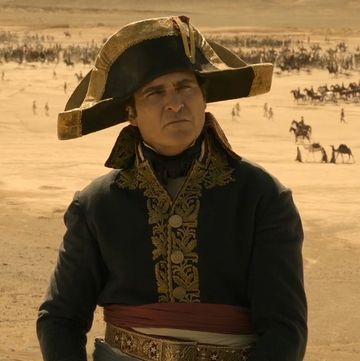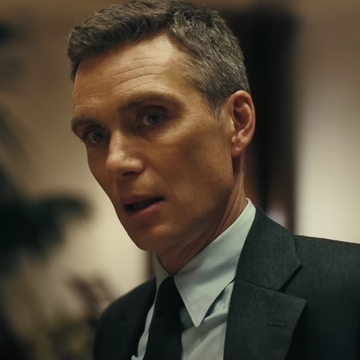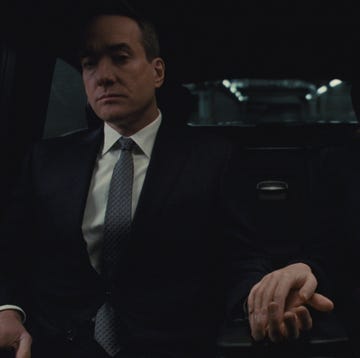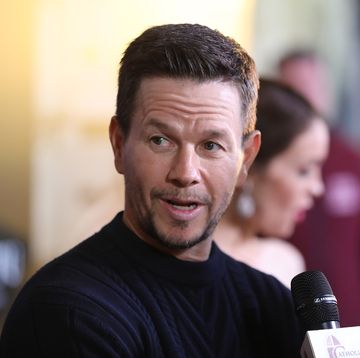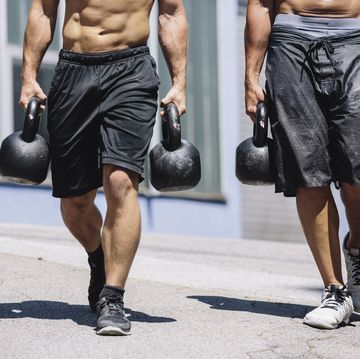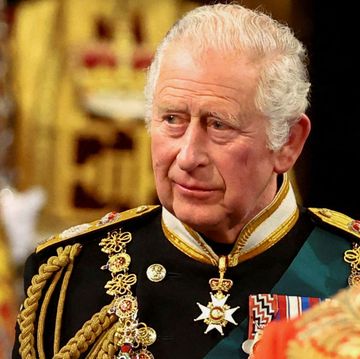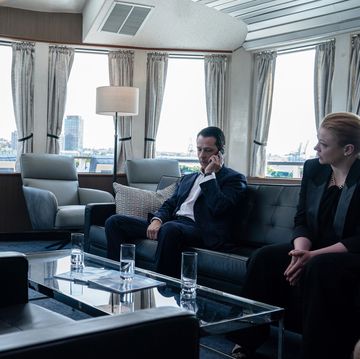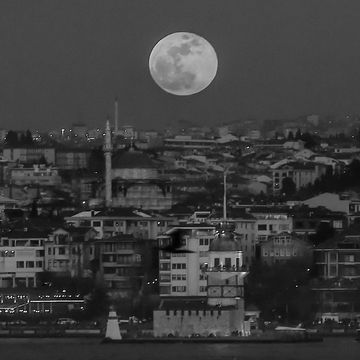Every episode of The Sopranos was uniquely wonderful and horrible, at once forcing me with its patterned silk-clad Italian-American strength to weep with laughter and seek one-to-five more milligrams of Zoloft. No character arc was each of these more so than that of Bobby “Bacala” Baccalieri, the endlessly sweet, often dense, food-loving soldier and caretaker of Junior, who throughout the series slowly gains major power in the Organisation. Bacala’s arc was one of the most gutting in the series—and one that, perhaps controversially, made up the entirety of my wedding vows this past September.
Brooklyn-born Steve Schirippa, who played Bacala, had never had a real recurring acting role until being cast on The Sopranos. Since then, he’s had a career that feels in part to be a natural extension of his work on the show—he’s written several books, including A Goomba’s Guide to Life, and The Goomba Diet: Large and Loving It, which was blurbed by James Gandolfini, Michael Imperioli, and Tony Sirico among other cast members, and he started a sauce company called Uncle Steve’s Italian Specialties. But he’s also worked in a number of roles that had nothing to do with the mob, like on The Secret Life of the American Teenager, on which he starred with Molly Ringwald and Shailene Woodley, and Blue Bloods, where he’s worked for the past few years.
Esquire spoke with Schirippa for the show’s 20th anniversary, about how he’ll always be known as Bacala no matter what he does, how he made Gandolfini laugh with a sex toy the size of an Italian bread, my wedding vows (was he interested? unclear), and the legacy of the show today.
This interview has been edited and condensed for clarity.
How did you find your way to the Sopranos? Did you audition?
I was working as an entertainment director in Las Vegas. I’m originally from Brooklyn and I moved to Las Vegas in 1980. I was working there, I was an executive at the Riviera Hotel. I had been acting. I started acting in the early ’90s, kind of as a hobby, getting bit parts here and there. Started growing a bit and getting more and more roles. Then I came to New York in January of, I think it was January of ’99, or Spring of ’99 for a wedding. My agent at the time, I asked him to get me an audition, and I went up and auditioned for Georgianne Walken for the role of an FBI agent. She said I don't see you as an FBI Agent, read this. Then I cold read the part for Bacala. They called me and I came back the following week on my own dime. And I got the role. I auditioned for her and then I auditioned for David Chase and about 15 other people. I don't even know who the hell was in the room, it was a lot of people. And that was it.
I reluctantly came back, to be honest. My wife was the one that pushed me; she said you’re only happy when you're doing this, go back. Because I didn't want to spend the money to put myself up and fly myself out. But I did it and luckily it all worked out. Everyone you talk to, they have a different story. Everyone had to audition, that I know. There was no not auditioning.
Bobby was the sweetest of the guys on the show, and I’m wondering how that evolved on set. Were you making choices that got integrated?
I didn't know. They sent me the script because at first I just auditioned one scene. And then when they sent me the whole script—first of all, I was in California. I’m reading the script and there’s all these fat references. And I’m going, you know, they're calling me a cannoli with legs, and you're Fat Bastard. And I said to my wife, did they hire the wrong guy? Because I’m not that much fatter than Tony Soprano. Honestly! I’m going maybe they got the wrong guy over here. Then, I got a call to come in a few days early to get fit for a fat suit. So my first two seasons I wore a fat suit on the show to be bigger than Tony. Way bigger than Tony. If you see that second season, season number two, I mean, I'm tremendous. Now that was a fat suit. I did that but I guess by Season Four I was fat enough on my own so they let me take it off. [Laughs]
No one ever talked to me about the character. I just made my own choices from the writing; what I thought, who I thought this guy was. In my head I gave him a background, but no one ever said to me, now this guy is this, this, and this. I just went by instinct. I was a caretaker to Uncle Junior. Obviously I like to eat, just from the writing. As the years went on, the role got bigger and bigger. Bobby got a little smarter, or stepped up to the plate better. He was closer to Tony. But no one ever told me that’s who the guy was. That was my choice and I took that from the tremendous writing. And that’s how we got Bobby Bacala. He was a family guy. He's the only one without a cumare [a mistress]. His wife died; you saw him at the coffin. Hopefully your heart breaks for this guy trying to raise his family. You know. Of course, he ate every chance he could get.
Speaking of which, I thought Bobby and Karen’s was one of the most iconic love stories on television. I just got married this fall, and my vows were just about Bobby and Karen.
Wow. Congratulations. [Laughs]
Thank you, thank you… But I’m wondering what it’s like to have such a pure, emotional moment on the show.
I’ll tell you this. There was two episodes that I had to get very emotional. It’s not easy. At the time, I was still living in Las Vegas, and I had an apartment here in Manhattan. It was the winter, I believe, when we were shooting it, and my family lived back home, at the time my daughters are young, and my wife. I was living on Mulberry Street and I was holed up in that apartment for literally like a month, going to work, really just going to work and going home and just getting myself in such a funk. At one point I said to myself, “And I’m doing this why? Why am I doing this to myself?” Because I had to go to such a dark place.
They didn't air back-to-back but we shot them back-to-back. When I was finished, man, it was just incredible. When it was finally over and I could go back to being myself. I was in a deep depression. I had to get myself there. There are some actors who can cry on cue and go back to laughing, and cry and go back to laughing. I had to get myself to a certain place to do it and it was tough. He had true love for this woman, and these other guys [the characters on the show] are laughing and snickering, and at the funeral didn't really care. They saw me at the coffin, you know, pouring my heart out. These guys were cut from a different cloth. I think Bobby was a sweet guy, as it’s said on the show. He inherited Junior from his father, so yeah, he did some bad things, but he didn't do things like those guys. Until he was forced to at the end by Tony Soprano.
The show obviously was extremely dark. Do you think your cast mates had similar issues with the material?
I don't know. Everybody has their own process. I know Jim [James Gandolfini], when he had to do violent stuff and stuff like that, that would—I don't know if it would bother him, but it takes you to a different place when you're killing guys and stuff like that. The show was tough, but the show was also sometimes slapstick funny. Everyone has their process, like I said. Some guys don't mind the fake killings. But sometimes you gotta get yourself in a lather, you gotta get yourself to a certain place to do certain things on screen.
Violence, for a lot of people, is tough to do if you're not that kind of a person and you gotta choke someone or whatever you gotta do on camera. It’s not always so easy.
Do you have a favourite episode?
I enjoyed “Pine Barrens.” I liked that very much because Tony came to me and asked me for help in finding them [Christopher and Paulie]. I think it was the first time you saw that Bacala might've had some brains. He could come up there, and he knew his way around. Obviously, he was a hunter; he was that kind of an outdoor guy. I enjoyed that.
We shot that and it just happened to snow. That was by accident. And we shot it up by West Point and we stayed up there in a hotel for X amount of days so I enjoyed that episode. Also, I’ve told this story before and I don’t want to be rude, but Jim was supposed to laugh when he saw me walk in in a hunting outfit. Do you remember that scene?
Yeah.
He's like, “I don't know how you're gonna make me laugh tomorrow, I’ve already seen the outfit.” So I ask the prop guy, and I didn't tell anyone else, and I ask him if he had any dildos. And he had this big giant one. It looked like an Italian bread. And when I turned that corner, I’m twirling it around. I’m off camera. That’s when you see Jim almost fall over laughing. And if you look at Uncle Junior he almost cracks but he doesn't. [Laughs] So that's how I got him to laugh on that.
I also liked the lake house [“Sopranos Home Movies”], which was the first episode where Bobby has a fight with Tony Soprano. I liked that because it was the four of us [Gandolfini’s Tony Soprano, Edie Falco’s Carmela Soprano, Bobby Bacala, and Aida Turturro’s Janice Soprano]. We were up in Tarrytown or wherever the lake was, and we were up there basically for two weeks shooting all that stuff. It was the first episode of the final season, and sometimes I looked and I said, Man, I can’t believe I’m here with these three great actors—Jim, Edie, and, even after all these years, Aida. I said, Look at this, this is pretty cool. We’re here shooting this, playing monopoly, whatever. I enjoyed that one also.
Since then, you’ve been associated with this iconic role. How has it affected your life?
I knew then that I would forever be Bobby Bacala. People would never forget that name and all of that stuff. I was very lucky—I got a show almost immediately when The Sopranos ended. Within like six months, I was on The Secret Life of the American Teenager with Molly Ringwald and Shailene Woodley. I was on that show for five years. I did 110 episodes, so more than double [I did for] The Sopranos. That was good fortune that I got that job, playing kind of a regular guy with a high school kid, which I was.
I’ve written books; I had some shows on Discovery; I turned one of my books into a movie for Nickelodeon. Now, I’ve been on Blue Bloods for four years. I play a DA investigator. But not a day goes by where someone doesn’t call me “Bobby” or “Bacala.” Not one day since the show. Not one single day has gone by where someone doesn’t go, “Hey Bobby!” “Hey Bacala!” “Hey, where’s Junior?” Not one day. Now they also call me Anthony, because that’s my character on Blue Bloods, so I get a lot of Anthony. But always Bobby, Bacala, what happened to the ending, what does that mean?
I was just in California, I got back yesterday. Young guys, nice, college guys from Saudi Arabia came up to me and said, “Are you Bobby?” They had accents. And I said, “Yeah.” And they said, “Can we take a picture?” blah blah blah. And I said, “Saudi Arabia?” I mean, that’s a long way, man. And he said, “Oh, we love The Sopranos.” It’s very big over there with the young Saudis. That’s what he told me. And I just was at a restaurant. I was at a restaurant eating.
So, I mean, all over the world I’m Bobby Bacala. And I’m okay with that. I don’t have a problem with that.
The show ended in 2007 and I’ve been very lucky to work. If it wasn’t for The Sopranos—I had no career before The Sopranos. I was just dabbling in acting; I had a full time job. My first season on The Sopranos, I had a full time job at the Riviera and I never told the hotel that I was acting and I never told The Sopranos that I had a full time job. I kind of led a secret life as I went back and forth across the country.
It’s been an incredible experience. If you're gonna be on one show, first of all, it’s impossible as an actor to get on a show. It's so hard. But if you're gonna get on one show, it's like hitting the lottery. And to get on The Sopranos and become a series regular? It's like hitting the lottery twice. No lie. To be a part of that. They'll be watching that show 50 years from now.
In 20 years, as you said, the appeal of the show hasn't waned at all. Especially on the internet it's gained a new life. There are a lot of viral Sopranos things; your Bert and Ernie Christmas special has recently—
Oh yeah, yeah. Absolutely. Also, listen there's a new generation. How old are you? You're young; how old are you?
I'm 29.
Okay. So my daughter's 27. She didn't watch it the first time around. She watched it later on. A lot of people didn't watch it the first time. They're watching it now, a whole new generation. My nephew's 25. They all just started watching it, all these kids in their late teens. Back then, they were little kids. It's a new generation, and it's also on Hulu and streaming and all this stuff.
Is there a reason you think it's timeless and still resonating so much with people?
First of all, I think it was so popular because it was about a family. There was more to Tony Soprano than just being a mob guy. You didn't just see killing and shooting like a usual mob movie, you know, killing, hang out at a club, you don't know anything about them. Here, you saw the family: he had problems with his kids, with his wife. I think it holds up every bit today. It was funny, it was tragic, it was violent, and it was sad. It hits all these emotions, you got a little bit of everything. Listen, I used to watch it on Sundays and then I would watch it again because you miss stuff.
I agree!
The writing is incredibly smart. I couldn't wait to get the scripts. They used to, back in those days if there was email I didn't have it, so they would FedEx the scripts to you. As soon as I got it, I would open it, see if I was in it, great, and make sure I didn't die. That was everyone's concern, that you were gonna get killed off.
How did it feel when your character eventually did in what was an incredibly sad episode?
I thought if I make it to the last season, okay, all bets are off, right? Because this is when stuff's gonna happen. Alright, I make it to the last season, I'm gonna get paid, I made it to the end, or close to it, okay. We started [shooting] in July because we were up, that's when we shot the lake house stuff, and now it was about January. This is how it happened to me. Usually, you'll get a call and David will say, “I wanna talk to you,” whatever. I got a call; I was having a cup of coffee, reading the paper. My cell phone rang and it said, "Hold for David." That's what his assistant said. I didn't even have a chance, you know, to say, "Not now..."
And he says, "Where are you?" And I say, "Well, I'm at the apartment," and he said, "The new one or the old one?" And I say, "I'm at my old one," he says, "Okay, I'm coming over." I went, "You're coming here?" Because you know, he's the boss! The CEO of your company doesn't come to the house. And he said, "Yeah, I won't be long." So about a half hour later, my wife said, "What's going on?" I say, "David's comin' here."
So the doorman called up and opened the door and he said, "Well. I guess you know why I'm here." It was kinda like a real hit, you know?
That's what it feels like!
And I said, "I guess so!" And we sat down, and he never took his coat off, and he stayed for about 15 minutes. And I said, "Well how does it happen?" And he was very vague, a train store. And we just talked. I said, "Well I hope you're happy. I want to thank you for changing my life." He said, "You did a great job,” buh buh buh. And that was it.
Ah!
That was it. It was kind of like a real hit. He was very vague. He wouldn't tell me. And we actually shot it, believe it or not, it took two days, and the first day was on Valentine's Day of that year. February 14th.
Wow. That's so sad.
And what I told Jim and the guys, I said, “David came to my house to tell me they're killing me.” Jim and the guys, they thought that was good. They said, "Wow, he doesn't do that." or "He hasn't done that much." So I kind of felt, I guess, a little proud? The boss came to the house to tell me in person. So that was a nice thing, you know. And I made it to the next-to-last [episode], so I really proved myself.
How does it feel to be thinking about the show 20 years later?
I've hardly watched it since it ended. I don't even know if I ever have watched it. I know they're doing a marathon on HBO; I watched my first episode, the first one I shot, and of course I look so much younger. I think it's great. Everyone's talking about it and it still holds up. Listen, the show ended in 2007, 12 years later we're still talking about it. No other show has been like this. No other show every Monday morning every radio show, every TV show, news show wanted to talk to us and talk about the show. It paved the way. It's hard to believe because when you're doing it you don't look back and smell the roses. But now you go, man, it was pretty cool to be a part of that.
Joanna Rothkopf is the former deputy editor at Esquire.com and a writer for Last Week Tonight.
